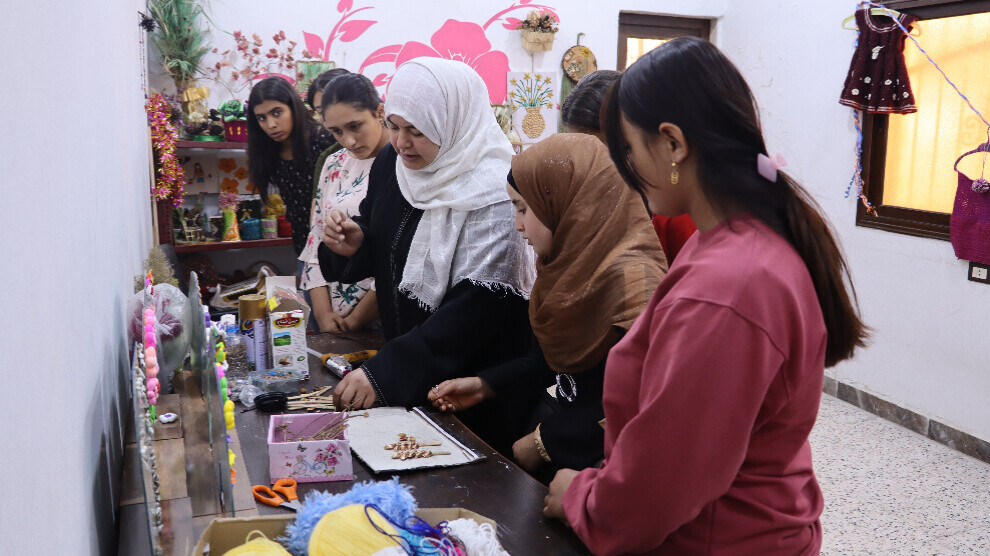Young women from Raqqa are carrying the legacy they inherited through the art of plaster into the future
The Free Women’s Foundation, through the plaster handicrafts trainings it organizes in Raqqa, aims both to provide young women with a profession and to revive the cultural heritage of the region.

NUR EL-AHMED
Raqqa – The Free Women’s Foundation, located in the city of Raqqa in North and East Syria, on September 10 launched vocational training on plaster decoration and the making of decorative items as a form and symbol of reviving the region’s famous heritage. Ten young women participated in the training.
Art Became a Source of Livelihood
Instructor Sawsan Ahmed says, ‘Since my childhood, I have had a love and inclination for handicrafts. By recycling old items, I discovered my ability to turn them into home furniture and decorative objects. Later, I began to develop my hobby and generate new ideas using digital media. I turned to the field of wax, granite, and plaster in order to create beautiful and original pieces and sculptures, some of which are used in home decoration. Today, this has become a way for me to provide my economic livelihood.’
‘It Opens New Styles and Horizons’
Also explaining her purpose in teaching, Sawsan Ahmed says, "In the past, I only worked from home and marketed my handicrafts through digital media. When I learned that the Women’s Handicrafts Training Foundation was opened, I proposed to share my experience and skills with young women of an age to master these handicrafts professionally. The stages of making plaster sculptures are simple and easy, but they require precision and focus. First, we mix plaster with water until it reaches the right consistency, then we add colors and create the necessary pieces. We leave the mixture to dry for about 20 minutes. I believe that handicrafts made of plaster, especially with women adding their own unique style, open up new horizons for creativity and art."
‘Women Gain Self-Confidence’
Emphasizing that the training contributes to women’s self-confidence, Sawsan Ahmed says, "Women bear the greatest burden of crises, wars, and their consequences. They now struggle with life on their own and take responsibility for their children. Therefore, these trainings help women gain self-confidence, achieve economic independence, and establish their own income-generating businesses. My future plans include designing various decorative products and participating in upcoming exhibitions. I think these works will be special and remarkable. At the same time, I aim to expand my workspace in order to develop my ideas and skills in the field of handicrafts, to train more young women, and to establish a workshop where they can realize their own projects. I especially encourage young women who are interested in handicrafts to join vocational training, because women can make use of their free time and recycle old and worn-out items into original pieces.”
‘I Feel Happy’
Trainee Yamam Abbas expressed that her reason for joining the training was her love for this idea being ‘unique and original.’ Stating that her two sisters also joined the training to gain skills, Yamam Abbas says, "This is a profession that can be done from home. Over the past few days, I have learned to make various beautiful shapes out of plaster using special molds. It is simple and enjoyable work that does not require much effort. I am satisfied with this experience. I feel happy. It becomes even more meaningful especially when it is given as a gift or souvenir.
‘Cultural Heritage is Revived’
Trainee Dunya Dervish also drew attention to the importance of the vocational trainings organized by the Free Women’s Foundation and continued her words as follows:
"These trainings have enabled young women to learn different professions that will help them develop their skills and establish their own businesses. My interest was drawn because the training has a unique idea that is different from others. Plaster is an ancient heritage in handicrafts. In ancient times, people decorated their homes with plaster statues because they had no other alternatives. Therefore, these trainings contribute to the revival of the cultural heritage of the region."
Expressing her satisfaction with participating in exhibitions, Dunya Dervish states, "We are currently preparing for upcoming handicraft exhibitions. We are working to produce handmade decorative pieces with original and beautiful ideas. I will participate with four of my works and I especially hope to inspire young girls; because these are works created with the creativity and sensitivity of women. Women’s hands and ideas bring out creativity and art wherever they are. They add light, life, and color to dark objects. After completing the training, I aim to start my own project and market the ideas I produce through digital media."
